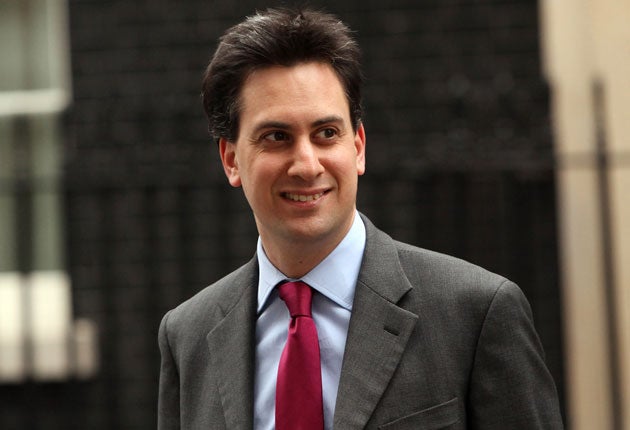Your support helps us to tell the story
From reproductive rights to climate change to Big Tech, The Independent is on the ground when the story is developing. Whether it's investigating the financials of Elon Musk's pro-Trump PAC or producing our latest documentary, 'The A Word', which shines a light on the American women fighting for reproductive rights, we know how important it is to parse out the facts from the messaging.
At such a critical moment in US history, we need reporters on the ground. Your donation allows us to keep sending journalists to speak to both sides of the story.
The Independent is trusted by Americans across the entire political spectrum. And unlike many other quality news outlets, we choose not to lock Americans out of our reporting and analysis with paywalls. We believe quality journalism should be available to everyone, paid for by those who can afford it.
Your support makes all the difference.Cabinet minister Ed Miliband became the latest victim of a new "phishing" scam on Twitter today.
Many of the Energy Secretary's 6,664 followers on the micro-blogging website will have been surprised to receive an unusually personal message from him at breakfast time.
"Hhey, i've been having better sex and longer with this here", said the "tweet" alongside a picture of a smiling Mr Miliband. The message was followed by a link to another website.
It was swiftly followed by a genuine "tweet" from Mr Miliband, admitting: "Oh dear it seems like I've fallen victim to twitter's latest 'phishing' scam."
Mr Miliband was not the only person at Westminster to find strange messages being sent out from their Twitter accounts.
Several journalists in the parliamentary lobby were contacted by friends asking why they had claimed to be "24, female and horny" in direct messages to them via Twitter.
And yesterday, Leader of the Commons Harriet Harman told MPs that her account had without her knowledge sent a tweet to a surprised shadow prisons minister Alan Duncan.
Ms Harman did not say what was in the bogus message, but sent MPs' imaginations racing when she told them: "I wouldn't ever send a tweet like that."
And Mr Duncan later wrote on his Twitter page: "I did get a message in Harriet's name, so I sent a friendly message back by text. A bit confusing, and all in my first week on Twitter."
Meanwhile, Labour MP Janet Anderson urged the Government to look into an organisation which had apparently set up "fake" Twitter accounts in the names of all North West MPs.
Falkirk MP Eric Joyce was one of many people at Westminster puzzled by messages they were receiving. He sent out a - genuine - tweet to say: "Something odd happening on Twitter. Getting spam messages from folk but not from them. Not exactly hacking, I think. Hope Twitter's on 2 it."
The reason for the rash of fake messages was not absolutely clear. One theory was that victims had responded to a tweet apparently coming from an acquaintance's account and reading "haha is this you?"
Once they responded, spammers were able to access their accounts and use it to send messages advertising questionable sites elsewhere on the web.
The incident has once again demonstrated the risks MPs can take when they try to show that they are up-to-date with new technology.
Twitter allows its users to write messages of up to 140 characters which are posted on their profile page and sent to their followers.

Join our commenting forum
Join thought-provoking conversations, follow other Independent readers and see their replies
Comments